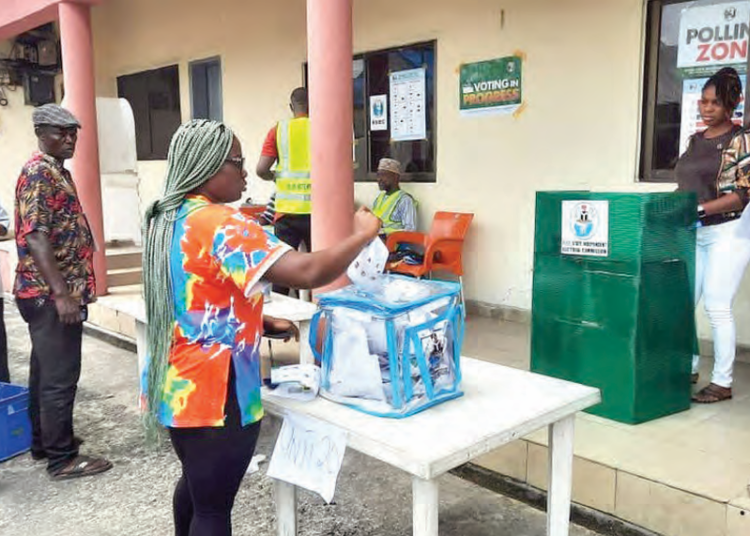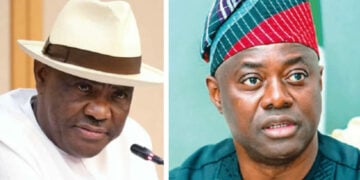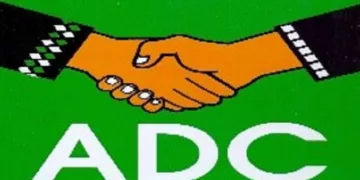Opposition political parties across the country have accused ruling parties in states and their governors of undermining democracy at the local government level by inaugurating their chairmen and councillors without conducting credible elections.
They described most of, or all, the council elections conducted by the incumbent governors as mere charades and a waste of public funds.
Investigations conducted by LEADERSHIP Sunday across the federation showed that the local government elections were largely the endorsement of candidates of the ruling parties and cronies of the governors that were announced by State Independent Electoral Commissions (SIECs) as winners of the contests that never, or hardly, took place.
According to them, from the planning to the execution stage, the SIECs demonstrated serious biases to make the rival parties and the electoral lose faith in the polls.
In the 2024 local government election in Oyo State, about three million eligible voters, over 4,900 candidates, and 18 political parties were said to have participated in it.
The election took place on Saturday, April 27, 2024 across the 33 local government areas and 351 wards in the state.
Since April 2023 when the Oyo State Independent Electoral Commission (OYSIEC), the statutory body responsible for the conduct of local government elections in the state, rolled out the timetable for the election, political parties and stakeholders were up and about canvassing for the votes of the electorate.
The commission’s chairman, Isiaka Abiola Olagunju repeatedly gave assurances of a free, fair and transparent poll, and a level playing field. With an impressive voter turnout, the pool is expected to be keenly contested and truly represent the will of the people.
After the election, OYSIEC announced the result amidst controversy of irregularities during the voting process, as the ruling policy party, Peoples Democratic Party (PDP) swept the polls.
However, after the official presentation of the results from all the 33 local government areas where elections took place, there were complaints from some local councils about discrepancies noticed during the electoral process, ranging from lateness of officials and materials to the non-availability of necessary materials in some.
One of the participating political parties, the African Action Congress (AAC) registered its displeasure with the conduct of the poll and called for its cancellation.
The party’s national publicity secretary, Fẹmi Adeyeye, alleged that Oyo State government did not conduct a credible election.
Similarly, the main opposition All Progressives Congress (APC) described the election as a sham.
The party’s publicity secretary, Wasiu Olawale Sadare, said that if allowed to stand, the election could cause disquiet in the state.
“With what is happening at the moment in most polling units across the state, Governor Seyi Makinde has again disappointed the whole world.
“He promised the people that their votes would count today but the opposite is the case. The good people of the state desired to participate in an election to elect a new set of council officials but what they are experiencing is nothing but a sham.
“Even if OYSIEC comes out later to declare all the candidates of the APC, we would not rate this election as credible and acceptable as it falls below the minimum global standard of election conduct.
The best thing is for the Commission to suspend the exercise and choose another date for a proper conduct rather than continue to connive with a few anti-democratic elements in the ruling PDP to perpetrate electoral fraud and desecration of democracy in the land.
“For the avoidance of doubt, OYSIEC started with a back and forth position on the need to deploy the Bimodal Voter Accreditation System (BVAS) for the conduct of the poll,” he said.
In Kebbi State, the LG election was conducted on Saturday, August 31, in all the 21 councils of the state. Eighteen of the 19 political parties participated with exception of Peoples Democratic Party (PDP) which withdrew from the exercise two weeks to the poll date.
At the end, the APC was announced by the State Independent Electoral Commission (KBSIEC) as producing all the 21 chairmen and 223 councillors in the state.
The chairman Inter-Party Advisory Council (IPAC) in the state, Comrade Ibrahim Muhammad, said the election was peaceful, free and fair.
But the state PDP secretary, Abubakar Bawa Kalgo said his party withdrew from the election due to manipulation and loss of confidence in the state electoral body.
In Anambra State, the ruling All Progressives Grand Alliance (APGA) recorded an overwhelming victory at the 28th September 2024 LG polls in the state, as it won all 21 chairmanship positions and 326 ward councillorship seats.
Chief Tony Chinedu, the commissioner in charge of publicity for the state independent electoral commission (ANSIEC), told LEADERSHIP Sunday that all the registered political parties except the APC participated in the election.
The Labour Party publicity secretary in the state, Hon. Theo Egbe, however, refuted the ANSIEC commissioner’s claim, saying his party did not participate in the election.
“It was in the public domain even ahead of the local government council election that Labour Party made it clear that it is not participating in the elections, and our party was in court challenging the state governor, Prof Chukwuma Soludo and the Anambra State Independent Electoral Commission over the manner the council elections were being organised,” he said.
The South East coordinator of the Civil Liberties Organisation (CLO), Comrade Alloysius Attah, described the council elections as shameful.
He stated the manner the poll was conducted was a clear violation of democratic principles.
Also, controversy has continued to trail last Saturday, October 5, in the local government election in which the ruling the PDP was declared by the Akwa Ibom State Independent Electoral Commission (AKISIEC) as having won the contest in 30 out of the 31 councils.
AKISIEC had during the pre-election press conference disclosed that out of the 19 registered political parties in the state, 12 were given a clean bill of health to contest, but at the polls proper, the battle was between the ruling PDP in the state and the ruling APC at the centre.
Amidst the euphoria of victory before the results were officially announced, Edwin Ebiese, the PDP publicity secretary, had declared that “it’s 31/31 for PDP,” before the AKISIEC chairman, Elder Aniedi Ikoiwak, declared that APC won in Essien Udim LGA, hometown of the Senate President Godswill Akpabio.
Besides winning the chairmanship slot, APC, our correspondent gathered, won seven councillorship slots, while Obongemem Ekperikpe Ekpo, the minister of petroleum resources (Gas), also deployed his influence to win two councillorship seats in his Ika LGA.
Aside that, the PDP cleared the contest in the other 30 local councils, forcing Akpabio and the Young Progressives Party (YPP) House of Representatives member for Ikono/Ini Federal Constituency, Emmanuel Ukpong-Udo, to cry foul, accusing the ruling PDP of colluding with AKISIEC to manipulate the results in favour of the ruling party.
Characteristically, the process was characterised by violence, general voter apathy, diversion of ballot materials to private homes.
The Centre for Human Rights and Accountability Network (CHRAN), a civil society organisation (CSO), led by the state director, Otuekong Franklin Isong, stated the need for the process to be corrected in future polls.
“We monitored the exercise; there was general voter apathy, people were playing football during the poll, there was violence in some LGs including Ibiono Ibom, where the SIEC office was torched. I think the election was generally peaceful,” Isong noted, even as he blamed the opposition for not fully entrenching themselves by campaigning and wooing voters before the election proper.
The local government election in Imo State was conducted on September 21, 2024. As expected, the ruling APC won all the 27 councils of the state and almost all the 305 wards.
The opposition cried foul and accused the ruling party of rigging the election, arguing that in a free, fair and transparent election, it is not possible for one political party to win all the council seats.
The Social Democratic Party (SDP), Imo State chapter, declared its readiness to challenge the process and outcome in court.
In Sokoto State, elections into the 23 local government councils were held on September 21, 2024, with the ruling party, APC, recording a clean sweep.
Subsequently, the elected chairmen were sworn in on Monday, 23 September, 2024, for a three-year tenure.
Though the other 15 political parties filed candidates in the election according to the state electoral body, the major opposition party, the PDP, did not participate in the election.
When contacted, PDP spokesman in the state, Hassan Sahabi said, “What do you expect from us to say about a shambolic, pre-determined election; we did not participate? On this, I will maintain a sealed lip. Three years is a long wait. The decision to participate or boycott future local government elections in the state will be taken when we get to the bridge.”
On the contrary, Sokoto State APC chairman Isah Acida expressed delight with the arrangements made by the electoral body and his party’s clean sweep in the election.
He said, “One of the things that ensured our maximum victory at the poll is the performance of the governor who is the leader of the party.
“Mentioned must also be made of our party supporters who trooped out statewide, conducted themselves in peaceful and orderly manne r, to ensure our victory,” he said.
In Enugu State, the last local government election was held on September 21, 2024.
Although opposition parties participated in the election, the PDP was declared winner of all the chairmanship and councillorship positions in the state. Enugu State has 17 councils and 262 wards.
The chairman of the PDP, Martin Chukwunweike, described the party’s victory as deserved, adding that his party carried out campaigns in all the local government areas and wards.
But a former chairman of the Inter-Party Advisory Council in the state and chairmanship candidate of the Accord Party in the election, Barrister John Nwobodo, in an exclusive interview with LEADERSHIP Sunday described the election as a caricature of democracy.
He, however, stated that his party was undeterred, adding that they will continue to advocate for deepening reforms to make local government elections truly reflective of people’s will.
Gombe State’s local government elections, held on April 27, saw the ruling APC win all 11 chairmanship and 114 councillorship seats.
Governor Inuwa Yahaya’s administration conducted its second LG poll in five years, but opposition parties cried foul, citing irregularities and non-conduct of elections in several polling units.
Inuwa maintained that his government provided a fair and transparent process, urging dissatisfied parties to seek redress through the tribunal.
But the APC’s sweep has sparked debate, with calls for electoral reforms to ensure future polls’ integrity.
The local government election across the 16 local government areas of Kwara State was held on September 21, 2024.
The candidates of the APC were declared winners of all the 16 and 193 chairmanship and councillorship seats in the state.
The commission also issued certificates of return to all the winners of the election on September 22,2024 while the state governor, AbdulRahman AbdulRazaq inaugurated the new council chairmen on Monday, September 23,2024.
However, the chairmanship candidate of the opposition PDP in Ilorin West local government area, Musbau Esinrogunjo rejected the outcome of the election.
He called on the National Assembly to expedite action on the passage of a law to empower the Independent National Electoral Commission (INEC) to take over the conduct of local government elections across the country.
Esinrogunjo said that credible local government elections could only be guaranteed by INEC and not state electoral bodies.
The deputy coordinator of Elites Network for Sustainable Development (ENetSuD), AbdulRazaq Olayemi, noted that the election was peaceful with a large turnout of the electorate, but marred by various forms of electoral malpractices.
The Bayelsa State Independent Electoral Commission (BYSIEC) conducted local government elections on 6 April 2024, in which the Peoples Democratic Party (PDP) won all eight local government areas and all legislative seats in the 105 wards across the state. Seventeen political parties participated, including major players like the Labour Party (LP) and others, while the APC boycotted the elections.
APC’s state publicity secretary, Doifie Buokoribo, expressed a lack of confidence in BYSIEC, alleging that the commission is composed of PDP members and that a predetermined list of winners was announced post-election. Engr. Udengs Eradiri, the Labour Party’s governorship candidate, criticised the election as undemocratic, citing high-handedness and corrupt practices throughout the electoral process.
Comrade David West, a member of the Civil Liberties Organisation (CLO) and a human rights advocate, echoed these sentiments, describing the election as a mere formality to confirm the governor’s candidates. He emphasised that if the Independent National Electoral Commission (INEC) had acted similarly, there would have been widespread outrage from Nigerians.
In Delta State, the PDP also dominated the local government elections held on 13 July 2024, winning all 25 chairmanship positions and 499 of the 500 councillorship seats, losing only one to the Allied Peoples Movement (APM). The election did not occur in Udu local government area, as the PDP chairmanship candidate was returned unopposed. Multiple parties, including LP and APC, called for a cancellation of the elections, with LP filing a petition citing substantial non-compliance with electoral regulations.
In Benue State, the ruling APC claimed victory in all chairmanship and councillorship positions during the recent local government election, with the chairman of the Benue State Independent Electoral Commission, Richard Tombowua, confirming that the APC won all 23 chairmanship and 276 councillorship seats. Senator Abba Moro criticised the election as a sham and an insult to democracy.
Borno State held its local government elections in January 2024, with the ruling APC winning all chairmanship and councillorship positions in the 27 local government areas. The PDP chairman in Borno, Alhaji Zanna Gaddama, denounced the election as a charade, accusing the ruling party of fabricating results.
In Jigawa State, the local government elections conducted on 5 October 2024, involved 12 political parties, with the APC winning all 27 chairmanship positions and 281 out of 287 councillor seats. The All Progressives Grand Alliance (APGA) and Accord Party won one and four councillor seats, respectively. APC chairman Hon. Aminu Sani Gumel expressed satisfaction with the election’s conduct, describing it as peaceful and fair.
CSOs Take On SIECs
The recent local government elections have raised concerns regarding the integrity of State Independent Electoral Commissions (SIECs). While some civil society organisations (CSOs) advocate for strengthening SIECs, others have called for their complete scrapping.
Ezenwa Nwagu, executive director of Partners for Electoral Reforms, argued for SIECs to be granted political and financial independence, stripping governors of the power to appoint commission members.
He stressed the importance of a collaborative effort among stakeholders to improve local government elections, advocating for reforms rather than the creation of new institutions.
Conversely, Irene Awunah-Ikyegh, president of the League of Women Voters of Nigeria (NILOWV), supports the call for the scrapping SIECs, citing their role as instruments of state governors that undermine democratic processes. She expressed disappointment in the continued use of SIECs to impose candidates and highlighted the need for accountability in electoral institutions.
Awunah-Ikyegh criticised INEC’s performance as akin to that of SIECs and called for enhanced advocacy for independence among all electoral bodies to restore public confidence.
She concluded that the ongoing discussions regarding the establishment of a new institution for conducting local government elections are a positive step towards reform.





